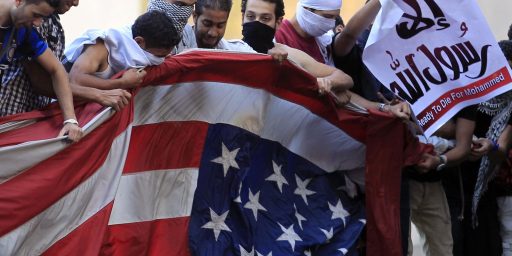The Politics of Language
What people (or transitional governments) say isn't ultimately the issue. What they do is.
 We have now been told by the Egyptian military that they are going to respect civilian control of the military and will only hold power until election can be held under a new/reformed (this is unclear at the moment) constitution.
We have now been told by the Egyptian military that they are going to respect civilian control of the military and will only hold power until election can be held under a new/reformed (this is unclear at the moment) constitution.
Part of the reason I have been especially cautious, perhaps even pessimistic in the eyes of some, in regards to the unfolding events in Egypt is that I have seen some of this movie before. Not, I would note, as exact copy, but there are key plot points that have emerged in the past (some passing examples here). These examples underscore that one has to be careful with how one interprets the words one hears as what the speaker intends by the term may not be what the hearers assumes.
To wit: “civilian control.” To an American ear this means the total subordination of the military to the elected civilian government. It is worth pointing out that, technically, the Egyptian government was one of “civilian control” insofar as Mubarak was a civilian president* and Egypt had, at least technically, a civilian parliament and Prime Minister. By the same token, it is worth noting that the military was a key political and economic actor during this period in a way that is radically different from what American (or Europeans, or really the citizens of any liberal democracy) would understand the term.
Also: “elections.” There were elections during Mubarak’s time in office. There were parliamentary elections and their were even multi-candidate elections for president the last time Mubarak stood for re-election. Of course, as has been widely documented, these were rigged elections.
As such, one hopes that there will be true civilian control and real elections. Indeed, for true democracy to come to Egypt the military has to be so subordinated to civilian rule that they cannot have any specific stake in the question of who wins elections and they have to serve whatever government is elected and formed, just like the other bureaucracies of the state. It is, however, too early to know what the military means by the terms noted above. As such, reasonable skepticism is warranted as we watch things unfold.
*Mubarak was a high level Air Force officer, but as best as I can tell, he did not retain his commission once he became Vice President. Even if he did retain symbolic military ties, he did not govern with the notion that his power came, formally at least, from the military, but rather from the constitution.





![Military Coup Underway In Egypt [Update: Morsi Deposed]](https://otb.cachefly.net/wp-content/uploads/2011/02/egypt-flag3-512x256.gif)
Steven; I don’t think for a moment were going to see in Egypt the emergence of a relationship between civilians and military remotely like that in the US. And after all it’s not unknown for US generals to lose sight of it from time to time (Viz: MacArthur and McChrystal). That said it’s probably going to more or less approximate to a democratic and pluralistic society which doesn’t mean there is no chance of a real military takeover but it’s probably fairly small. What you’re going to see is probably something that replicates the relationship in power political terms that existed between civilians and military in the French third Republic or maybe Wilhelmine Germany. Theoretically the civilians/monarch were in charge but the military was an immensely powerful component of society.
One must also be prepared for the real possibility the military itself doesn’t know what those terms mean, or how to best guide the process of transition back to civilian control. The situation could well deteriorate not via nefarious purposes, but through all-too-human incompetence.
“The situation could well deteriorate not via nefarious purposes, but through all-too-human incompetence.”
I think this is all too true. The military in Egypt is a mass of different power centers who were held together by the glue of Mubarak. The people at the top all have fiefdoms which they jealously guard and that’s without going down to the lower general or regimental officers (and if you think we have General overload you should see Egypt). They’ve had power unexpectledly dumped in their laps (this has all happened in three weeks remember); there’s a huge surging mass of humanity with high expectations outside; there are powerful clandestine organisation lurking beneath the surface; and major allies are expecting movement to democracy and a more fair society. I’m sure confusion reigns at the moment about the how to move forward. They’d be well advised to elevate Baradei as the negotiating face of the “people” but that’s just a personal view.
I tend to agree with Jennifer Gandhi’s classification rules. (Steven, if you don’t know her book on Authoritarian Institutions, consider it assigned reading! I finally picked it up the other day. Can’t imagine what spurred me to do so…)
She says that if an authoritarian leader comes to power with a military background, even if he ceases to be an active duty officer, that’s a military regime. I tend to agree (and thought so well before this crisis) that Egypt’s regime was fundamentally military in character throughout these past 50+ years.
Basically, the Latin American model of an authoritarian regime where an active general heads the government is not necessarily typical elsewhere.
In other words, I think it would be a mistake to suggest that civilian control has been in place under Mubarak, even in a “technical” sense.
@MSS:
I agree that the basic nature of the Egyptian regime was military, even if Mubarak no longer held a title. My point in this case would be that from the perspective of the Egyptian military that when they say that they will respect “civilian control” from their POV that they could well have considered the previous order of things to have been “civilian control.”
And beyond LatAm off the top of my as-yet-not-fully-caffeinated head there are other cases of leaders overtly retaining military titles and the like include Pakistan and Libya. And didn’t Park Chung-hee retain his military title in South Korea?
Nonetheless, I agree about the point in terms of understanding the nature of the regime from an analytical perspective, but again: my point was simply caution over reading into statement made by the military.
And no, I am not familiar with the Gandhi book. I will have to give it a look!
BTW, the reason I am cautious (and flirt with pessimism) is that despite all the drama and remarkable events to date, the basic nature of the regime remains in place and, indeed, the military’s position at the moment is actually enhanced vis-a-vis the other institutions of the state.
I have my doubts about their willingness to cede too much of their interests to a truly civilian government.